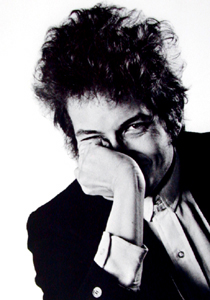![[Metroactive Music]](/gifs/music468.gif)
[ Music Index | North Bay | Metroactive Home | Archives ]
Random Revolution
This year's model vs. the album
By Karl Byrn
I was zooming into the heart of my position in a debate with a younger tech-wizard co-worker. He was fresh from the Mac World Expo held last month in San Francisco, and his enthusiasm for the latest Apple gizmo--the ultramini iPod Shuffle--had prompted my art-guy defense of that tower of rock music artistry, the album.
"For example," I said, "if I wanted to hear a Bob Dylan album--"
"But why would you want to do that?" he volleyed back, effectively ending our debate with a wholesale dismissal of an artist who 40 years ago made it essential for rock albums to be artistic statements.
When new technology makes vast song selections almost instantly available in infinite combinations, does the rock album really matter? The question seems purely aesthetic, pitting the pleasures and possibilities of science against the romantic concept of serious artists with grand intentions. Yet a debate over how we choose to receive our music, over how much attention big musical statements really merit, is a debate that pokes at larger cultural eddies.
The coming ubiquity of the iTunes Music Store and the iPod is subtly shifting discussions about online music downloading away from the once-hot issues of ethics. "Legal downloading" is a euphemism for a state in which music-industry powers that be have asserted control over the cutting edge of consumption. In this state, ease of consumption is the key. Art and our right to share art are now secondary to convenience.
The iPod Shuffle, conveniently no bigger than a pack of gum and meant to be worn as a necklace, is a strong push away from the consumption of rock in album form. Apple's marketing pitch for the iPod Shuffle simply states that "Life is random." Unlike the iPod, which holds 10,000 songs, or even the iPod Mini at 5,000 tunes, this year's model holds 240 songs. That's less room for complete albums or personal play lists--it's specifically built for random play. The iPod Shuffle page on Apple's website goes so far as to call the device "the official soundtrack to the random revolution."
The random revolution? I know "random" is a hot buzzword with teens, but what's the revolution? If the pop-music experience is now random, how can there be any given soundtrack?
The desire to cut and paste our listening experience is supremely functional, because it's historically rare for a pop album to work as a cohesive piece of art. Yet great rock albums are deeply profound links in shared human experiences, and rock music as a whole has always functioned on collective archetypes. Does random mean we're in an era when the rock experience is exclusively micro-individual, and is no longer received collectively?
Perhaps--but it would be a mistake to call this a generational shift. Consider that in the '60s, when artists like Dylan and the Beatles birthed the idea that albums could have a higher function as complete statements, baby boomers still primarily consumed rock as singles. Most albums were collections of singles and filler, and even through the '70s, Top 40 radio offered tremendous variety in random order. Baby boomers were really the original attention-deficit listeners.
Conversely, younger music fans still gravitate to the idea that an album merits attention as serious art. One of the best alternative rock magazines on the market, CMJ New Music Monthly, is built on dozens of straight album reviews, and recently dared to publish its first "Top 20 Albums of the Year" list. But the mag also features a monthly disc that randomly samples from the albums reviewed. This highlights an important point: the impulse to parse pop randomly actually coexists with the impulse to receive albums as cohesive art.
Technology seems to support these opposite needs. The pre-"legal downloading" argument for file sharing always correctly insisted that file sharing pointed the way for samplers to make album purchases. The iPod Shuffle boasts a feature that lets you "download an album from the iTunes Music Store and listen to it in order before you shuffle it into your collection," with the option to return to "play in order mode." The biggest promoters for the iPod are U2, a band who have always treated the album as a canvas for grand statements. The key hook to the iPod U2 Special Edition isn't its red cover, but a $50 credit for a download of all U2 albums.
The "random revolution" doesn't seem ready to let the album slip away. I've been sampling 30-second song snippets on iTunes all afternoon, so I'm ready to log off, take Dylan's Blonde on Blonde out of the stereo and receive collective art via Neil Young's Zuma.
[ North Bay | Metroactive Central | Archives ]
Copyright © Metro Publishing Inc. Maintained by Boulevards New Media.
![]()

Life Is Random: Bob Dylan is not.
From the February 9-15, 2005 issue of the North Bay Bohemian.